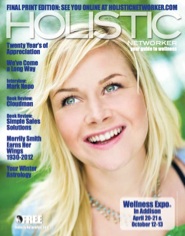A Traditional Chinese Medicine Approach to Nutrition
by Allie Chee
In Traditional Chinese Medicine (TCM), human emotions and physical health are seen as deeply intertwined—as mutual correlations. As the body houses the mind, nourishing our body allows for proper functioning of the mind and supports clear, positive thought. Positive thought and a healthy mind create a peaceful body that can function with balance. The yin/yang symbol, now well-recognized in the west, symbolizes two aspects of any phenomenon, in this case health, put together and forming the entire phenomenon—the two make the one.
TCM includes many traditional practices intended to simultaneously support healthy mind and body functioning, including: herbal medicine, acupuncture, massage, meditation, Qigong, and last but not least, nutrition.
Food—What Difference Does It Make?
People can easily accept to what degree the things they consume (plants, animals, chemicals) affect their mind/body when the effects are very strong and immediate: plants such as tobacco, coffee beans, and mushrooms of a particularly lively variety, are a few examples.
However, people generally don’t understand how much foods can affect their systems when the effects are slower and more subtle in manifesting. This is for several reasons: they may be simply unaware, unfamiliar with or have a dislike of nutrient-rich foods, or they may desire to continue eating foods that are counter to health.
Nevertheless, according to Traditional Chinese Medicine (TCM) food therapy principles, every single food item has an energetic and healing property—warming, cooling, drying, lubricating, etc.—that affects the body as a whole and can more strongly affect particular organ systems, creating great change over the medium- and long-term. World-renowned TCM Dr. Maoshing Ni, in Secrets of Self-Healing, writes, “What you eat probably affects your health more than anything else you do.” With that empowering statement in mind, how do we determine what is best to eat for optimal health from a TCM perspective? Many factors are considered when planning the ideal diet: hereditary issues, individual constitution, gender and age are those that people in the west would expect to find on the list. However, there are many other factors included in TCM nutrition, including season of the year.
The Seasons—How Do They Affect Us?
Once again, human beings can easily accept how greatly the change of seasons affects the natural world. We all know that trees go dormant in winter, that many animals slow their activity or hibernate in winter, and that spring is a popular time for courtship in the animal kingdom. We humans, though, so often detached in our modern life from the lifecycles of nature, are quite unaware of the great impact the change of seasons can have on our bodies.
In September and early fall, we are barraged with “it’s-cold-and-flu-season” advertising. Are we really condemned to sickness just because of the beautiful change of seasons? According to TCM nutrition principles, with such great changes occurring in all of nature, if we are in a weakened state, we could indeed be subject to common, seasonal ailments.
The seasons, in TCM, each have a corre- sponding organ system that is more strongly affected at that time, and we can eat “with the season” to support the health of that organ in particular and the body/mind as a whole. The organs associated with fall are the lung and large intestine. The seasonal ailments related to fall and to those organs are: breathing difficulties and bronchitis, colds and flu, allergies, skin eruptions and constipation.
However, if we, along with the other aspects of a healthy lifestyle, eat foods that support the body, we sail happily through the fall season and have prepared ourselves well for winter.
Foods for Fall
The fall season brings cooler weather and to maintain balance, we can adjust the temperature (both the temperature in our western understanding of hot or cold to touch, and the energetic “warming” or “cooling” property) of our foods accord- ingly. It can be beneficial to begin cutting back and eliminating the cooling foods of summer: raw foods and salads, juices, and abundant fruits. Frozen foods and drinks are never recommended and should be mostly avoided in fall. Other cooling and dampening foods (greasy, refined and fried foods, frozen drinks and dairy) can lead to ailments such as sinus infections, cough with mucus, and stuffy nose. Begin eating more warming and cooked foods. As we’d cut back in spring and summer, we can begin now to increase protein consumption. Replace salads with lightly steamed vegetables and soups, and eat cooked foods with warming spices. Of particular benefit are yams, carrots, winter squash, bok choy, broccoli, leek, beets, and pumpkin; barley, wild rice, and whole grains; garlic, ginger, rosemary, sage, and thyme; and seasonal fruits.
With the globalization of the food industry, it can be difficult to know what food is harvested locally and at what time of year. Some of the most beneficial (and delightful) fruits harvested in The United States during fall are: pomegranate (season: September- January), cranberries (usually harvested in October), and apples and pears (harvested in late summer / fall). Fruits can be cooked with cinnamon or cardamom to “warm” them and to prevent mucus formation. Doesn’t just the thought of apples baking with cinnamon conjure up beautiful images of fall and imbue the body with warmth? Finally, here is a classic TCM recipe to have on hand this season. To support the lungs in fall in the event of dry cough: core a pear, pour rock sugar in the center, bake until soft, and enjoy!
This is the forth and final article in a series that covers eating with the seasons. For all articles in this series, visit:
http://holisticnet.wpengine.com/wp/author/allie/
These are general guidelines for people in a state of balance and good health. Though season is considered, when there is any disharmony, a person’s individual constitution and current state take precedence over time of year when making food recommendations.
 Allie Chee is a Certified Chinese Medicine Nutritionist and can be contacted at: question@askalliechee.com
Allie Chee is a Certified Chinese Medicine Nutritionist and can be contacted at: question@askalliechee.com
About Allie Chee
Allie is a certified TCM Nutritionist and author of New Mother: Using a Doula, Midwife, Postpartum Doula, Maid, Cook, or Nanny to Support Healing, Bonding, and Growth











Hello,
I have been looking for information on how our bodies get ready for the change of season. My grandmother used to always give us special teas and soups during the season change and some sort of laxative to help our body transition. She believed that our bodies were purging in preparation for the new season. Thank you for this information. I have been google searching quite extensively and this was the only information I found. It was a good start. If you know any other websites or information on the affects on the body as the seasons change and foods we should eat in preparation it would be greatly appreciated.
Thanks again for this wonderful article.
Sincerely,
Safiya